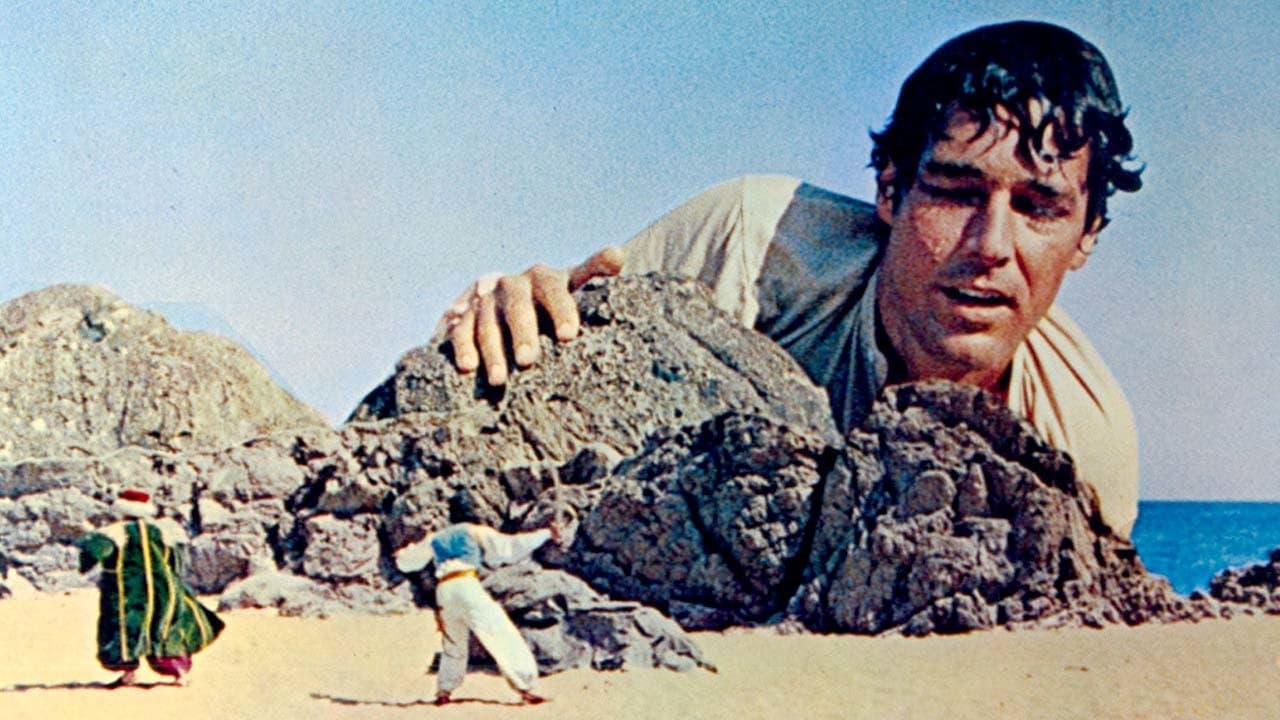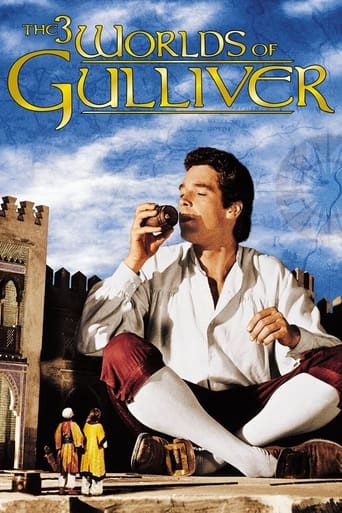

Me-oh-my! - You know, it sure takes watching a 1960 Fantasy/Adventure picture just like this one to really make one realize just how totally spoiled we all are by today's CG imagery. Yep. We sure are.And, if the creaky, old-school visual effects here weren't hokey enough as it is - Unfortunately - This picture's story-line was also a really irksome affair like nothing you could ever imagine.It sure seemed to me that no matter which world Gulliver travelled to - Be it the big or the small - Everyone was forever bickering and complaining and finding yet another lame excuse for going to war with one another.... Sheesh! - Give me break, already!.... I can't begin to tell you how fed-up I got with all of this utter nonsense.I mean, had the story been an interesting one, then, yes, I could have easily forgiven its laughable special effects - But, between the plot and the visuals it was all just second-rate entertainment from start to finish.
... View MoreNever viewed this 1960 film dealing with Gulliver's travels and found it very enjoyable to view along with excellent photography. The story starts out with Dr. Lemuel Gulliver, (Kerwin Williams) having a fight with his girlfriend, Elizabeth, (June Thorburn) about his wanting to go aboard a ship as a doctor and she does not want him to leave. The ship sails and becomes shipwrecked and Gulliver finds himself in a completely different land where there are miniature people and he appears to them as a huge giant who must be captured and tied up. The rest of the story will hold your interest from the very beginning to the end and I almost forgot, a war was almost started over cutting an egg on the top and other people who cut their eggs on the bottom of the shell. Enjoy.
... View MoreThis pleasant yet dated little 1960 family movie arrives is part of Columbia TriStar's "Ray Harryhausen Signature Collection." However, unlike Jason and the Argonauts, First Men in the Moon, The 7th Voyage of Sinbad, The Golden Voyage of Sinbad, and 20 Million Miles to Earth, there's not much here to thrill the average Harryhausen fan. Other than a quick battle with a giant alligator and a dino-sized squirrel that's more mirthful than menacing, The 3 Worlds of Gulliver doesn't depend on Harryhausen's famed stop-motion monsters to menace our hero. Instead, it features cinematic effects that make seafarer Dr. Lemuel Gulliver (7th Voyage's Sinbad, Kerwin Mathews) a skyscraper-tall behemoth on the isle of Lilliput and a doll-sized castaway "witch" in the court of Brobdingnag. The script is just a wire hanger for the "giant/tiny" effects scenes, but the story moves briskly (even a pair of treacly song-breaks don't get much in the way), and it should particularly appeal to the under-10 set who haven't yet become jaundiced to anything pre-dating modern CGI gloss. Mathews is plenty wholeseome and likable in a role first offered to Danny Kaye and (no kidding) Jack Lemmon. And Gulliver's fiancé/wife (June Thorburn) is perfunctory but not too much of a drip. Look for Peter Bull, Dr. Strangelove's Russian ambassador, in a small role. Of course the script is loosely based on the first half of Jonathan Swift's ribald 1726 novel, Gulliver's Travels. While the book remains one of the hardest-biting social satires ever to draw blood from the pompous and the political, few of those teeth remain in this truncated adaptation. Nonetheless, the Lilliputian social order and its Emperor's single-minded war against a neighboring island - fought over an absurdly trivial matter inflated to genocidal levels by unbending ideological fervor - are still recognizable targets. Visually, Harryhausen's tall/small effects are well done, though a viewer accustomed to more recent breakthroughs should expect to see the seams showing and hear the floorboards creaking. For a good number of fans, Bernard Herrmann's fine score is the chief appeal here.
... View MoreFrankly, I didn't even expect a serious treatment of the novel - I thought it would do to Swift what other movies were doing to Verne and Wells at the time. And I could have lived with that perfectly. Unfortunately, "The 3 Worlds of Gulliver" does not achieve this level of entertainment. First of all, the actor playing Gulliver is a bore. Well, he probably would have gotten away with it hadn't his part been so badly written. The Gulliver character is not discovering anything in this movie - he is a patronizing and moralistic missionary man; basically just out there to explain the achievements of his 'modern' culture to the primitives. So, don't expect adventure, expect sermons.Secondly, the jokes aren't funny. They are all about how stupid foreign cultures are and how much they need a lesson in democracy. The only really funny character is a young gothic girl who has a short appearance towards the end of the movie (and the actress is not even credited!). Thirdly, the production values are poor. Ray Harryhausen worked on this - and it hardly shows. The cheesy special effects are OK with me, but the whole doesn't even look attractive in a nostalgic sort of way.Check this out if you must, maybe your kids will like it. But if you have respect for your children, show them the Max Fleischer cartoon. It's ten times funnier and far less pretentious.
... View More